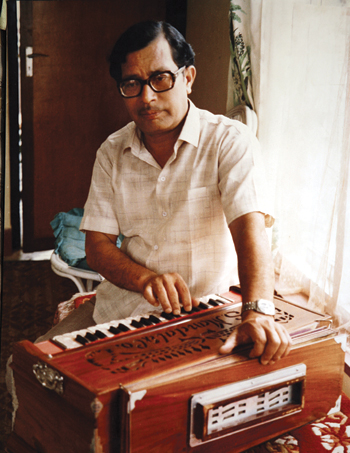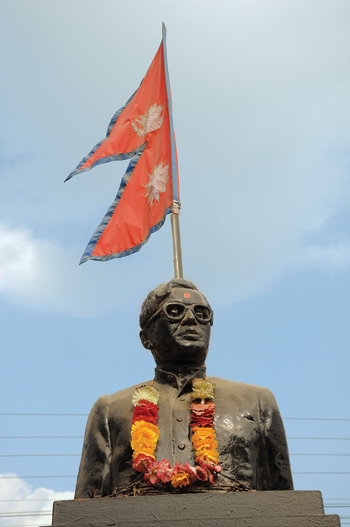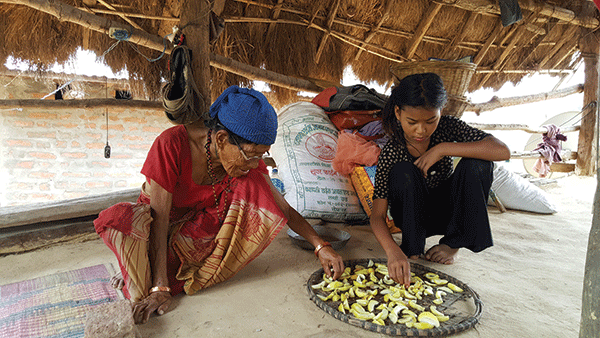Most of us know Narayan Gopal through his songs, here’s getting to know the legendary singer through his friends.
Swor Samrat” Narayan Gopal Gurubacharya is considered one of the greatest singers Nepal has produced. Born on October 4, 1939, he sang over 500 songs before his demise on December 5, 1990, due to diabetes and chronic renal failure. Four associates from his past recount their first meeting with the “Tragedy King” and reveal how his personality metamorphosed over the years.
 Yogesh Vaidya is a veteran singer, poet and lyricist. He shared the stage with Narayan Gopal on many occasions.
Yogesh Vaidya is a veteran singer, poet and lyricist. He shared the stage with Narayan Gopal on many occasions.
The first time I met Narayan Gopal was at Ram Man Trishit’s house in 2014 BS. I was born and raised in Nardevi. Narayan Gopal lived in Kilagal, a neighbouring tole. Despite being in such proximity, I didn’t know him since he had not started singing yet. When I was in class 8 or 9, an ex-student, Dr. Ram Man Trishit, used to visit and help out during musical programs at school. He also lived in Kilagal where he had a room where people got together, sang and learnt music. I used to go there after school and it was there that I met Narayan Gopal for the first time.
Narayan Gopal’s house was next to Ram Man’s and he used to visit all the time. I remember him wearing short shorts. He was 3 or 4 years older than me but everyone called him “Sanu”. He used to play tabla and was also a great mimic. He impersonated the news presenters of All India Radio and imitated the singers as well. He was a jolly person, he liked making people laugh. But, at the same time, he was arrogant too. He didn’t present himself well with people he didn’t know. His arrogance did not fade away but he certainly knew how to utilize it.
After being friends with Gopal Yonzon, he started associating more with the Darjeeling group. I believe this had a positive consequence. He interest in literature grew and his song selection improved in a critical way. He started associating with literary figures and was influenced by poets. With this came a depth in his music and lyrics. This also meant there was a change in his personality. When I met him later, there was a certain gravity to his character. He wasn’t jolly like earlier and there was a refinement to his arrogance, if that makes any sense.
A few months before he died, Prem Dhoj Pradhan, Nati Kaji, Shivashankar and I visited him. He was really happy to see us. He was jovial but we could feel something was wrong. He loved to eat and so, before we left, he said he would invite us for some thalthalay maasu some day. That was the last time we met, or at least, the last time we met when he was still able to talk. This is also, incidentally, my favourite memory of Narayan Gopal.
Prem Dhoj Pradhan is a legendary singer and childhood friend of the “Swor Samrat”. “Timro Jasto Mutu” is one of his favorite Narayan Gopal songs.
 This first time I met Narayan Gopal was in 2008 BS at a friend’s cotton shop. Laxman, my friend, said he would introduce me to someone I would get along with. It was Narayan Gopal. He was around 13 years old then, younger than me by 3 years. He was a bit shy but he played the cotton stacked in the shop like a percussion and started to belt out a Hindi film song. I remember saying, “Mitho chha, bhai!”
This first time I met Narayan Gopal was in 2008 BS at a friend’s cotton shop. Laxman, my friend, said he would introduce me to someone I would get along with. It was Narayan Gopal. He was around 13 years old then, younger than me by 3 years. He was a bit shy but he played the cotton stacked in the shop like a percussion and started to belt out a Hindi film song. I remember saying, “Mitho chha, bhai!”
Two years later, Dr Ram Man Trishit started a group called Nava Kala Pariwar which I was a part of. Narayan Gopal lived next door and was always over. The purpose of the Pariwar was to go to different toles once a month where 5 or 6 of us sang for an hour. Narayan used to play tabla but was too shy to sing. At Ram Man’s house, however, he used to sing on request while I played the tabla. This is how we became friends.
Narayan was particularly fond of the Indian singer, Manna Dey. He was a simple, genuine, good-humored person. If he made a mistake, he was always ready to apologize. However, he didn’t let anyone take advantage of him. I admired that quality. This is one of the reasons why he was one of the first people to take up the issue of royalty with Radio Nepal.
Later, we used to meet occasionally. A few months before he died, I met him at Radio Nepal, sitting beside a tiny pond, smoking a cigarette. His feet were swollen. He told me he had quit alcohol but couldn’t quit cigarettes. He smoked around 25-30 sticks a day. In fact, I used to tell him to quit or at least control his drinking from time to time. He always nodded but never replied. The last time I met him was when he was in the hospital. He didn’t talk, just shook his head. He died the next day.
Ratna Shamsher Thapa is a noted poet and lyricist. Of the 25 or so songs Narayan Gopal and him worked on together, only 10 have been found.
I first met Narayan Gopal at Tri Chandra College. He was a classmate of mine. We started working together in 2016 BS for a function celebrating Tri Chandra’s anniversary. “Swarga Ki Rani” was one of the first songs we collaborated on. The event went on for 5 days and on every single day, people kept requesting “Swarga Ki Rani”. It was after this that he came into prominence. Some time later, after getting a contract with Radio Nepal, he asked me if I could write some lyrics for him. I agreed. He then signed a six-song contract with Indreni Records. All of them featured my lyrics, including “Swarga Ki Rani”. And all of them were superhits.
Narayan Gopal was a fun, friendly person and our combination worked well together. As for his skills with music, he was a great composer and had incredible range. I sometimes used to joke and tell him to add more keys to his harmonium. Another admirable quality was that he was always looking to do something new. We used to bunk classes to go to his place and work on songs. He was not hackneyed; he had a different vision. I think he was pretty clever in that he didn’t let his music stagnate, unlike a lot of his peers. He worked with different people and experimented and that’s what contributed to his success.
We drifted apart when he started working with Gopal Yonzon. People have speculated but nothing really went wrong - we just stopped talking. See, I have a reciprocal nature. I don’t give anyone the upper hand. If people think that Narayan Gopal is the sole reason for my success, I want them to know that I am still on top when it comes to my field. We broke off our relationship 50 years ago but I am still here.
Peter Karthak is a journalist and a musician. He spent many an evening in groups with Narayan Gopal at a ‘tharra pasal’ in Ason but they never drank together.
I first met Narayan Gopal in Darjeeling in 1962, when we were both students of Amber Gurung. Hillians, the band I was in, was very popular then and, seeing our potential, Mr Gurung asked us to perform for Narayan Gopal, who was visiting. He invited us because Nepali songs at that time, funded by King Mahendra, had become really popular, thereby overshadowing the music of Darjeeling where we lacked financial support. Mr Gurung had a bit of an inferiority complex because of this so he wanted us to show Narayan Gopal what we were capable of. That was our first encounter. We wanted the entire band to perform but we couldn’t, so it was just me playing one guitar with some harmonized vocals. We played our song “Mayalu Mayalu” and then he requested some Western rock as well. We complied by playing “PS. I Love You” and “I Saw Her Standing There” by the Beatles. According to Mr Gurung’s instructions, we showed him how we operated musically in a modern way in Darjeeling.
He was a quiet personality. Unlike a cosmopolitan society like Darjeeling, he was from Kathmandu which was socially more suppressed. We couldn’t understand his Newari accent laden Nepali and he didn’t have good English either. He was a bit moody as well.
We became closer when I moved to Kathmandu. My wife’s brothers were friends of his and he used to treat her like a sister. Personally, I don’t agree with the title “Swar Samrat”. There were far greater singers but, yes, he did have a great range. I also played on a few of his special recordings. It was during one of these sessions in 1976 that I last met him. It was also Narayan Gopal’s last recording at Radio Nepal. He never went back due to internal political disagreements. This was also when I learned that Narayan Gopal had stopped talking to Gopal Yonzon and that their partnership had been broken forever.










